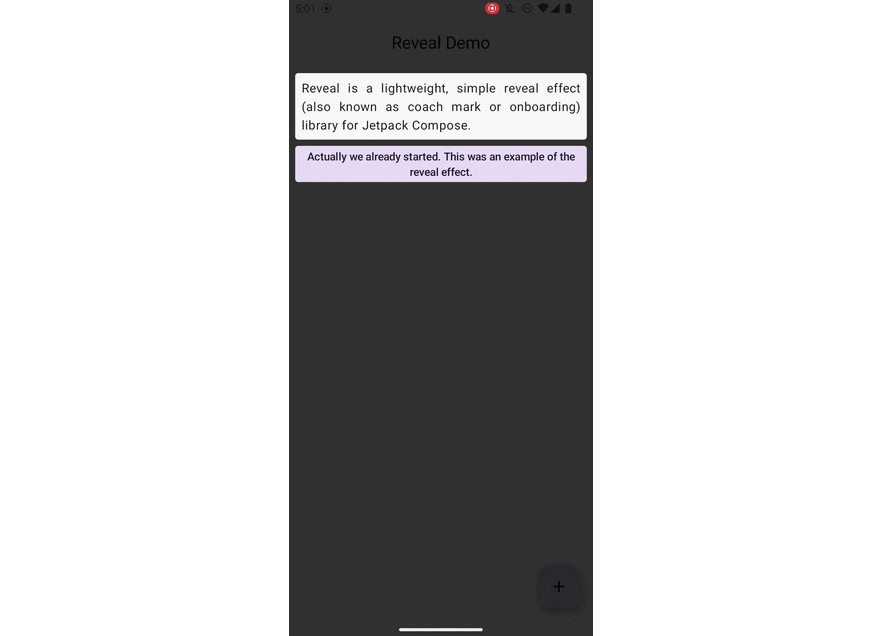Lightweight, simple reveal effect for Jetpack Compose with a beautiful API

Reveal is a lightweight, simple reveal effect (also known as coach mark, onboarding, tutorial, etc.) with a beautiful API for Jetpack Compose.
Terminology
| Term | Description |
|---|---|
| Revealable | An element which is revealed on the screen. |
| Reveal area | The area which is revealed around the revealable. Usually with a slight padding. |
| Overlay | The overlay which greys out all contents except revealable. Can contain explanatory items. |
Getting started
Installation
Add Reveal as a dependency to your project. It’s available on Maven Central.
dependencies {
implementation("com.svenjacobs.reveal:reveal-core:$REVEAL_VERSION")
}
Compose
Since you probably want the reveal effect to cover the whole screen, the Reveal composable should
be one of the top most composables in the hierarchy of your screen-level composable.
@Composable
fun MainScreen(
modifier: Modifier = Modifier,
) {
val revealState = rememberRevealState()
Reveal(
modifier = modifier.fillMaxSize(),
revealState = revealState,
onRevealableClick = {},
onOverlayClick = {},
) {
// Contents
}
}
Inside Reveal specify revealable items via the revealable modifier.
enum class Keys { HelloWorld }
Column {
Text(
modifier = Modifier.revealable(key = Keys.HelloWorld),
text = "Hello world",
)
}
Now launch the reveal effect via revealState.reveal(Keys.HelloWorld).
Nice, you just launched your first reveal effect. But what is missing is some explanatory item like text or image next to the reveal area. So let’s add one.
Explanatory items are specified via overlayContent of the Reveal composable.
Reveal(
overlayContent = { key ->
when (key) {
Keys.HelloWorld -> {
Surface(
modifier = Modifier
.align(RevealOverlayAlignment.Start)
.padding(8.dp),
shape = RoundedCornerShape(4.dp),
color = Color.White,
) {
Text("This is an explanation")
}
}
}
}
) {
// Contents
}
The scope of the overlay content composable provides the align() modifier to align the item either
to the start, top, end or bottom of the reveal area.
Reveal provides two click listeners: onRevealableClick is called when the reveal area is clicked
with the key of the current revealable as the first argument. onOverlayClick is called when the
overlay is clicked somewhere, also with the key argument. Use any of these click listeners to reveal
the next item, for example for some kind of tutorial, or to hide the effect via
revealState.hide().
That’s it for now. For more details have a look at the demo application and the JavaDoc. The library is well documented ?
